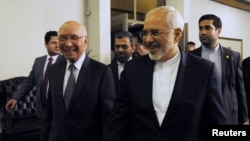Iran’s foreign minister arrived Wednesday in Pakistan for a two-day visit that's part of an effort by both countries to find a diplomatic solution to the crisis in Yemen.
Tehran and Islamabad agree that dialogue is the way to resolve the conflict, in which Houthi rebels have clashed with forces loyal to the country's internationally backed president, Abd-Rabbu Mansour Hadi — but they differ on how to proceed to such talks.
Sartaj Aziz, the Pakistani prime minister's adviser on foreign affairs, appeared at a joint news conference with Iranian Foreign Minister Mohammad Javad Zarif. Aziz suggested that the U.N. Security Council adopt a resolution to enforce a cease-fire in Yemen, place an embargo on arms supplies and disarm the Houthis.
Zarif, who was expected to urge Islamabad to reject a Saudi request that it join a military operation against the Shi'ite Houthis, disagreed, saying Yemenis should decide how to end the conflict.
"We in the outside world, in the region, can only facilitate,” he said.
"The people of Yemen should not have to face aerial bombardment," Zarif added, referring to airstrikes by the Saudi-led coalition that started last month.
For the past three days, Pakistani lawmakers have been debating the Saudis' request that they send planes, boats and troops to the operation in Yemen, and not one has spoken in favor of complying.
"The consensus that is emerging in parliament is that Pakistan should not participate in any military offensive. We should try to mediate, influence and facilitate peaceful dialogue," Aziz said.
Zarif said that all of his country's efforts were organized along four principles: “cease-fire, humanitarian assistance, intra-Yemeni dialogue and broad-based government.” He recommended this to Pakistani, Turkish and Omani leaders, he said.
He also indicated that his country was willing to use its influence with the Houthi rebels to secure an immediate cease-fire in Yemen.
Many fear the conflict could become a proxy battleground for a sectarian war. Iran, a Shi'ite theocracy, has links to some of the rebels being bombed by Saudi Arabia, the center of Sunni power.
Iranian and Pakistani officials agreed on the need by all parties for greater flexibility. They also agreed on other regional issues, such as the need for their nations to cooperate to bring stability to Afghanistan; to improve security on the long and restive border between the two countries; and to improve economic ties, especially if Iran completes a comprehensive nuclear deal with six world powers and gets sanctions against it lifted.
Some information for this report provided by Reuters.

